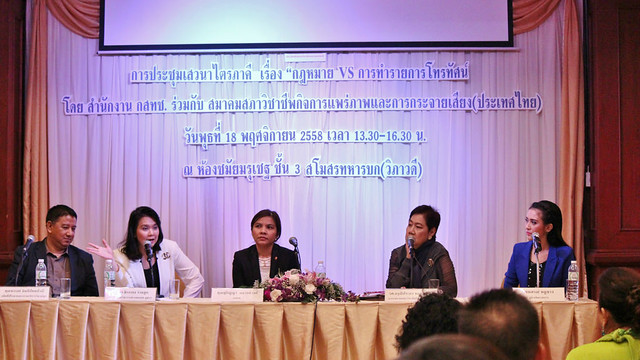Media experts have pointed out that the military regime uses the 2008 broadcasting law and a broadcasting regulatory agency as a media control apparatus.
According to iLaw, the Office of the National Broadcasting and Telecommunications Commission (NBTC) and the Professionals of Broadcasting Council (PBC) (Thailand) on 18 November 2015 co-organised a seminar titled ‘Law vs. Production of TV Programmes’ at the Royal Thai Army Club in Bangkok.
The discussion was about the interpretation and enforcement of Article 37 of the 2008 Act to Assign Radio Frequencies and Regulate Broadcasting and Telecommunication Services under the current military government.
In brief, Article 37 of the Act prohibits the broadcasting of programmes with content that could cause the subversion of the democratic system of governance with the monarch as the head of state or that could affect national security, social order, public morale, or public health. The article also prohibits the broadcasting of obscene content.
Under Article 37, the NBTC shall investigate TV or radio operators who violate the act. If proven guilty, the operators can have their broadcasting permits revoked by the NBTC.
At the discussion, Pirongrong Ramasoota, Chairperson of the Department of Journalism and Information of the Faculty of Communication Arts of Chulalongkorn University, said that the National Council for Peace and Order (NCPO) established a working group to monitor TV programmes after the 2014 coup d’état.
This working group of the NCPO monitors the political content of programmes which could be viewed as violations of NCPO orders before filing complaints with the NBTC.
“After the NCPO assumed power, the broadcasting of political content is a ‘priority watch list’ of the NBTC,” said Pirongrong.

A seminar titled ‘Law vs. Production of TV Programmes’ at the Royal Thai Army Club in Bangkok on 18 November 2015 (courtesy of iLaw)
The Chulalongkorn lecturer added that TV operators who were shut down by the coup-makers were forced to sign memoranda of understanding (MOU) with the NBTC not to broadcast content that could violate the orders or announcements of the junta’s NCPO if they wanted to go back on air, particularly Announcements No. 97/2014 and 103/2014
Announcement No. 97/2014 of the NCPO states that all media outlets are prohibited from criticising the coup-makers and presenting information which contravenes the junta’s measures to maintain national security.
However according to Announcement No. 103/2014, which was issued to amend certain clauses of Announcement 97/2014, ‘honest’ and ‘constructive’ criticism of the junta is allowed, but any information discrediting the coup-makers is still prohibited and people who violate the announcement will be investigated.
Pirongrong said that given the current political circumstances and the broad interpretation of Article 37, the NBTC broadcasting committee could not decide what is illegal and what breaches media ethics.
She pointed to a recent case in which the NBTC summoned for a discussion the executive board members of Thai PBS over a TV news programme called “Before becoming the New Democracy Group: Looking Back at the Movements of the 14 Students from Dao Din and in front of the Bangkok Arts and Culture Centre” broadcast on June 28 2015.
Chawarong Limpatamapanee, Chairperson of the National Press Council of Thailand, said that the broad interpretation of the Article 37 is problematic.
He said that in other countries with a democratic system of governance there are already laws that limit certain freedoms, but the 2007 Constitution drafters also added these limitations into Article 37 of the 2008 Act to Assign Radio Frequencies and Regulate Broadcasting and Telecommunication Services, resulting in its ambiguity when it comes to enforcement.
During the discussion, Supinya Klangnarong, a member of the NBTC’s Broadcasting Committee, said that the NBTC should take action against broadcasters who violate the law in order to protect consumers before using its authority to rule on programmes with political content, but currently it is the opposite.
“Actually, the NBTC should also help the operators to balance the [NCPO’s authority] not just echo the NCPO,” said Supinya.
Aruneeprapa Homsethi, Chairperson of the Professionals of Broadcasting Council (PBC), said at the discussion that the PBC already has clear guidelines on media ethics and the Thai media can use these guidelines to keep each other in check.
“Perhaps it is time to foster cooperation among the media [outlets] themselves. Can they halt competition for the time being and create a unified standard?” said Aruneeprapa.
Pirongrong concluded “it has to start by making the PBC known to the public and make it a credible alternative to the NBTC in accepting complaints. If [we] don’t want the NBTC to step in, [the PBC] has to do this themselves.”
Prachatai English is an independent, non-profit news outlet committed to covering underreported issues in Thailand, especially about democratization and human rights, despite pressure from the authorities. Your support will ensure that we stay a professional media source and be able to meet the challenges and deliver in-depth reporting.
• Simple steps to support Prachatai English
1. Bank transfer to account “โครงการหนังสือพิมพ์อินเทอร์เน็ต ประชาไท” or “Prachatai Online Newspaper” 091-0-21689-4, Krungthai Bank
2. Or, Transfer money via Paypal, to e-mail address: [email protected], please leave a comment on the transaction as “For Prachatai English”
